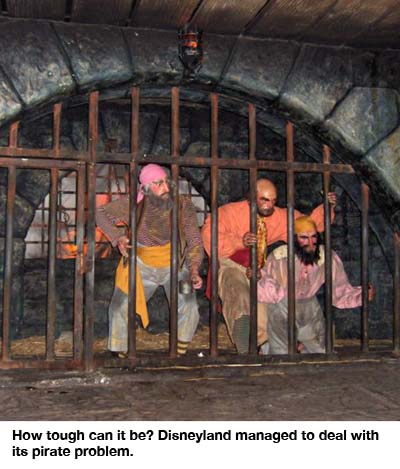Three international naval groups are cruising for pirates off Somalia. But no one is sure how to detain them.
The most eyebrow-raising aspect of Western counter-piracy missions off Somalia is how rarely they arrest a pirate. Last September, I spent a few days on a Turkish frigate called the Gediz, one of NATO’s busier ships in the Gulf of Aden, and the captain admitted that even when they catch pirates, they almost never make an arrest.
“NATO doesn’t arrest for piracy,” Capt. Hasan Özyurt told me, “but nations do. It depends on the situation, and it’s case by case. … Each nation has some policy for detention.”
So what happens when NATO stops a pirate boat? “At a minimum,” said NATO Commodore Steve Chick, speaking for the whole alliance, “we will always take measures to ensure that their weapons are destroyed, so as to deny their future use.”
But that’s it. The sailors tend to dump the weapons overboard and deposit the pirates back on a Somali beach.
Last week a group of legal experts gathered for talks in the Netherlands and failed to come up with a single, smart way to navigate the international problems with prosecuting pirates. They wondered if the Hague-based International Criminal Court would expand its remit to pirate cases, and the consensus answer was “no.”
“The ICC does not have an international police or task force to enforce the ICC statute,” said Geert-Jan Knoops, a Utrecht University professor of international criminal law.
This means that no single force, operating under a single set of rules, exists to gather evidence on arrested pirates and bring them to trial in The Hague or any other international court. A single force or a single set of rules would be useful, because one complication with prosecuting pirates is the number of national interests involved.
What if, for example, a Dutch warship chases Somali pirates attacking a Greek-owned vessel, and even catches the mother ship, which happens to be a hijacked Yemeni fishing dhow loaded with plenty of weapons and 20 kidnapped fishermen?

Answer: The Dutch would let the pirates go.
It really happened in April. Dutch law says the Dutch navy can arrest a pirate if he’s in Dutch waters, harms a Dutch citizen or happens to be Dutch himself. Otherwise, the pirate goes free.
Most European nations, including maritime giants like Germany and Denmark, have similar policies. American policy gives the U.S. Navy more leeway, but its principles are largely the same. Fifth Fleet spokesman Lt. Matt Allen told me the Navy doesn’t arrest people on the high seas at all — “Arrest is a law enforcement term,” he said — but the Navy has detained a handful of suspected pirates this year for prosecution in Kenya.
“Each event is reviewed for its evidentiary value,” based on “guidelines provided by the Kenyan government,” he said.
Only one suspect — Abduwali Abdukhadir Muse — has gone to the United States for trial. Muse was arrested by the FBI for his role in kidnapping an American citizen, Richard Phillips, captain of the Maersk Alabama.
Normal protocol in these situations is to let the home nation try its own criminals. But Somalia has no central government, no coherent piracy laws, and it hasn’t signed up to the U.N. Convention of the Law of the Sea. To get around this problem the U.S. as well as the EU have signed “memoranda of understanding” with Kenya to let their navies bring captured pirates to Mombasa, the nearest stable African port.
But it’s a stop-gap measure. Right now at least a hundred suspected pirates are awaiting trial in a dirty Mombasa jail, and it’s not clear they will receive anything like a fair trial.
One reason for the understanding with Kenya is to avoid embarrassing requests for asylum once the pirates have been tried in wealthier nations like the Netherlands or the United States. One Somali pirate convicted in the Netherlands told his lawyer last May that his Dutch prison cell was comfortable; he wanted to bring his family over when his prison term was up. Abduwali Abdukhadir Muse looked exuberant when he first arrived in Manhattan last April — until he was told his visit to America would involve an awful lot of prison time.
The ongoing lack of an international pirate court, combined with the unwillingness of most Western governments to prosecute, should ensure that a few hundred determined Somalis will keep trying to hijack ships. Even U.S. Secretary of State Hillary Clinton, after a talk with her Dutch counterpart in April, admitted that releasing pirates “sends the wrong signal.” But nothing, since then, has changed.
Sign up for the free Miller-McCune.com e-newsletter.
“Like” Miller-McCune on Facebook.
Follow Miller-McCune on Twitter.
Add Miller-McCune.com news to your site.





